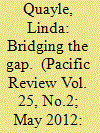|
|
|
Sort Order |
|
|
|
Items / Page
|
|
|
|
|
|
|
| Srl | Item |
| 1 |
ID:
123145


|
|
|
|
|
| Publication |
2012.
|
| Summary/Abstract |
The objective of a 'people-oriented' Association of Southeast Asian Nations (ASEAN) has not readily translated into easy relations between the Association and regional civil society. Discourse inspired by global civil society has found plenty to focus on in the gap between aspiration and practice. This article argues, however, that not enough attention has been directed to the bridges that are gradually forming across that gap, and suggests that an 'English School'-derived account can give a fuller picture of what is under way in this area. From this perspective, a process of institutionalization is observable among the different actors. By tackling - consciously or unconsciously - core problems such as recognition, location of common ground, confidence-building, and burden-sharing, this process is potentially transforming the relations of a state-imposed hierarchy into something more societal. The usefulness of such an approach lies in its ability to describe a process of slow change on its own terms, to normatively validate the fragile bridges under construction, and to stake out possibilities for progress on the basis of negotiation and accommodation.
|
|
|
|
|
|
|
|
|
|
|
|
|
|
|
|
| 2 |
ID:
157810


|
|
|
|
|
| Summary/Abstract |
Why does Indonesia, whose regional leadership would seem to flow so obviously from its material and normative footprint, and whose role as primus inter pares is readily, if sometimes grudgingly, acknowledged by its peers, struggle to translate that position into an unambiguous, consistent, and effective regional presence? While there are many possible answers to this question, this article focuses on societal interpretations, arguing that such a role is exercised not in a vacuum, susceptible to measurement against a set of fixed criteria, but in the context of its respective region's unique and constantly evolving profile. Drawing on the English School's concept of institutions, and focusing on three areas within the ASEAN Socio-Cultural Community (migration, disaster preparedness, and the environment), the article argues that the paradox of Indonesia's powerful-but-not-powerful position reflects the kind of ‘great-power management’ that is to be expected in the restrictive context of regional international society, and is profoundly influenced by the uneven interplay of institutions embedded at different levels in the regional experience.
|
|
|
|
|
|
|
|
|
|
|
|
|
|
|
|
| 3 |
ID:
119488


|
|
|
|
|
| Publication |
2013.
|
| Summary/Abstract |
This article uses the so-called English School of International Relations (ES) as a lens through which to examine Indonesia's trajectory as a regional power and a would-be world power. The ES approach has always emphasized the social dimensions of great-power status, which factor in, alongside material components, a mutual recognition of special rights and duties. But its scholars have not yet paid much attention to the issue of self-conceptualization as an element in that status. By examining the case of Indonesia, this article begins to fill that gap. It draws on a range of material to highlight a variety of internal narratives on Indonesia's power, which are often paradoxical, and often at odds with the external discourse. A region-theory 'dialog' on this topic therefore offers an alternative perspective on Indonesia's constraints and opportunities, while also refining ES perspectives on the topic of power and powers.
|
|
|
|
|
|
|
|
|
|
|
|
|
|
|
|
| 4 |
ID:
119227


|
|
|
|
|
| Publication |
2013.
|
| Summary/Abstract |
Hedley Bull's distinction between diplomatic and cosmopolitan culture, though insufficiently developed, has two applications in the context of the Association of Southeast Asian Nations (ASEAN). It provides a broader theoretical backdrop to the oft-noted need for a thicker socio-cultural underpinning to counterweigh ASEAN's elite diplomatic culture; and it offers an alternative perspective with which to critique ASEAN-focused efforts in that direction. This article uses the diplomatic/cosmopolitan dyad to examine a range of regional communication initiatives, from cartoons and computer games to Facebook communities and curricula. While some still represent an essentially diplomatic culture that has simply been transferred to a popular environment, others have the potential to promote a more genuinely cosmopolitan vision that better enables citizens to come to terms with both the rough and the smooth of regional cooperation. The article suggests that ASEAN would be well advised to promote hands-off communicative efforts that not only give participants scope to explore, but also accommodate the ineluctability of contention and difference in regional affairs.
|
|
|
|
|
|
|
|
|
|
|
|
|
|
|
|
|
|
|
|
|